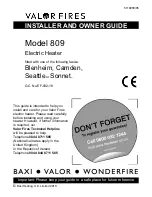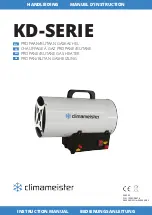
3
General safety notes
The use of upright gas cylinders from which
gas
is taken in the gas phase
is mandatory
for the operation of gas regulators, gas equip-
ment and gas systems. Gas cylinders from
which gas is taken in the liquid phase (e. g. for
fork lifts) must not be used, since they would
result in damage to the gas system.
In the event of leaks in the gas system or if
there is a smell of gas:
– extinguish all naked flames
– do not smoke
– switch off all appliances
– shut off the gas cylinder
– open the windows and doors
– do not actuate any electrical switches
– have the entire system checked by an expert!
Repairs may only be carried out by an
expert.
– This device may be used by children aged 8
years or above and by persons with reduced
physical, sensory or mental capabilities or lack
of experience and / or knowledge, only if they
are supervised or have been given instruction
with regard to the safe use of the device and
have understood the potential risks. Children
must not use the device as a toy.
– To avoid the risk of accidental resetting of
the over-temperature guard, the device may
not be supplied with power via an external
contactor, such as a timer, nor may it be
connected to a power circuit that is regularly
switched on or off via a device.
Danger –
Failure to operate the P&T safety valve
(Fig. 1 - 4) at least once every six months may
result in the water heater splitting. Continuous
leakage of water from the valve may indicate a
problem with the water heater!
– Water may drip from the discharge pipe of
the P&T safety valve and this pipe must be
left open to the atmosphere.
– The P&T safety valve is to be operated regu-
larly to remove lime deposits and to ensure
that it is not blocked.
– Any discharge pipe connected to the
P&T safety valve is to be installed in a
continuously downward direction and in a
frost free ambient.
– Before accessing terminals, please ensure
all supply circuits are disconnected (i.e.
230 V – 240 V and 12 V) and that the gas
supply is securely turned off.
– Any work involving connection or intercon-
necting wiring must be carried out by a li-
censed electrician. If the mains cable (supply
cord) is damaged, it must be replaced by the
manufacturer, its service agent or similarly
qualified persons in order to avoid a hazard.
– Any modifications to the unit, including ac-
cessories and cowl, or the use of spare parts
and accessories that are important to the
operation of the system that are not original
Truma parts and failure to follow the installa-
tion and operating instructions will void the
warranty and release Truma from any liabil-
ity claims. It also becomes illegal to use the
appliance, and in some countries this even
makes it illegal to use the vehicle.
– The operating pressure for the gas supply is
2.75 kPa (AUS – Propane) and must corre-
spond to the operating pressure of the appli-
ance (see data plate).
– LPG systems and pressure regulators must
comply with the technical and administra-
tive regulations of the country in which the
appliance is used. For your own safety it is
absolutely necessary to have the complete
gas installation regularly checked by an ex-
pert (at least every 2 years). The vehicle own-
er is always responsible for arranging the
gas inspection.
– Do not operate when travelling.
– Do not operate the water heater when refuel-
ling the vehicle and when it is in the garage.
– Items sensitive to heat (e. g. spray cans)
must not be stored in the installation area,
since excess temperatures may occur there
under certain circumstances.
– During the initial operation of a brand new
appliance (or after it has not been used for
some time), a slight amount of fumes and a
slight smell may be noticed for a short while.
Содержание UltraRapid
Страница 15: ...15...


































